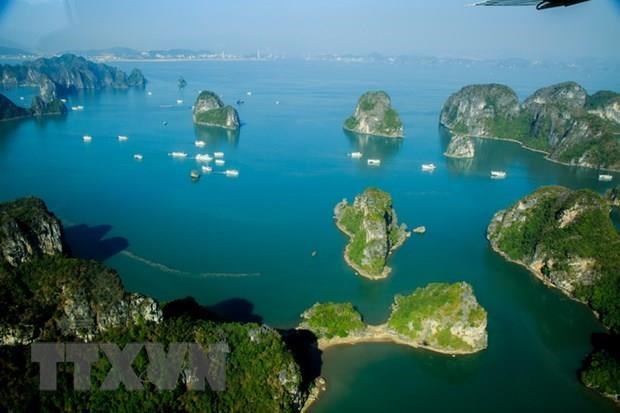
Ha Long Bay (Photo: VNA)
The city has implemented a number of measures to improve environmental protection such as removing factories causing pollution and maintaining the monitoring of environmental quality in the bay and surrounding areas.
It also strengthens the inspection of environmental protection of organisations and individuals providing tourism services in Ha Long Bay.
The city is speeding up the construction of daily sewage treatment facilities in coastal areas. It is also carrying out a 154 million USD project using official development assistance (ODA) loans to improve the environment.
The city asked organisations and individuals running tourism services in Ha Long Bay to not use disposable plastic products from September 1, 2019.
Local authorities have encouraged people to sort waste at source and limit the use of plastic bottles and nylon bags while touring the bay.
Service providers in the bay were asked to use paper cups, straws and bags to serve their customers, according to the Ha Long Bay Management Board.
So far, Ha Long has launched four communication campaigns on reducing plastic waste.
The city has maintained close relations with international organisations to obtain their financial and technical support to serve the preservation and promotion of heritage values of Ha Long Bay.
Thanks to these aforesaid measures, in the first nine months of 2019, the number of tourists to Ha Long city increased 21 percent to reach 7.9 million.
The municipal tourism sector grossed over 15.7 trillion VND (679 million USD) in revenue in January-September, a year-on-year rise of 35 percent.
Ha Long Bay literally “descending dragon bay” is a must-see destination in Quang Ninh province. It was recognised as a UNESCO World Heritage Site in 1994 and 2000.
The bay spans 1,553 square kilometres and includes 1,969 islands of various sizes. It features thousands of limestone karsts and islets in various shapes and sizes. The limestone in the bay has gone through 500 million years of formation in different conditions and environments. The geo-diversity of the environment has created biodiversity, including a tropical evergreen biosystem, oceanic and sea biosystem.
Ha Long Bay is home to 14 endemic floral species and 60 endemic faunal species.
In April 2019, US-based newspaper Business Insider made a list of 35 most beautiful natural wonders around the world, in which Vietnam’s Ha Long Bay claimed a place.
According to the news website, the beauty of Ha Long Bay makes it one of Vietnam’s top tourist sites. It also recommends that tourists see the UNESCO-recognised site’s awe-inspiring limestone towers by boat.
Previously, Ha Long Bay was ranked 14th in Business Insider’s list of the 100 most beautiful UNESCO World Heritages in 2018.
So far this year, Ha Long Bay has gained a lot of global titled. In July, the bay was listed among the world’s most beautiful sunrise spots by the Microsoft Network (MSN).
“What’s more memorable when you see the sunrise in Ha Long Bay, natural wonders with turquoise waters, majestic limestone mountains and lush tropical forests,” MSN wrote.
“What you need to do is take a boat tour on Ha Long Bay and wake up at 5pm to catch mild, romantic sunshine unexpectedly,” it added.
In August, British travel magazine Rough Guides included Ha Long Bay in its selection of the 100 most beautiful places to visit next year.
In the Rough Guides to the 100 Best Places on Earth, the magazine describes “the scattering of limestone pinnacles jutting out of the smooth waters of Ha Long Bay”, around four hours east of Hanoi, as an “incredible sight”. The bay was the only Vietnamese destination in the list.
In September, Ha Long Bay was named as one of the most popular attractions in Asia, according to the South China Morning Post (SCMP) based in Hong Kong.
Around 5.2 million foreigners visited Ha Long Bay in 2018, up 22 percent from a year ago, accounting for 30 percent of the 15.6 million foreign tourist arrivals to Vietnam./.